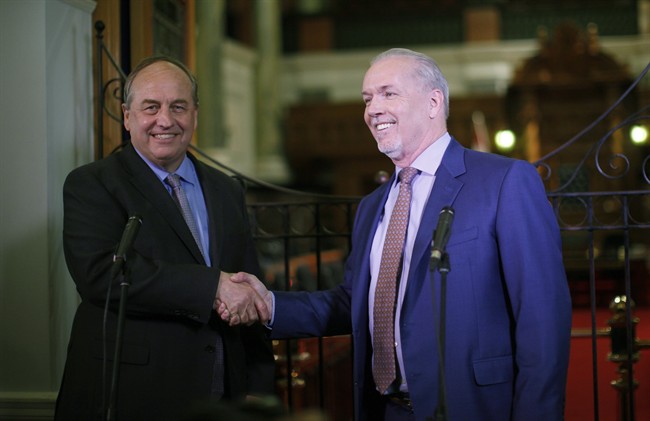See you in court.
That’s the message from B.C. NDP Leader John Horgan, who said Wednesday that once he becomes premier he’ll take the legal route to block the Trans Mountain pipeline expansion.
Horgan made the statement in a joint interview with Green Party Leader Andrew Weaver on Corus Vancouver’s Jon McComb show, a day after inking their landmark power-sharing deal.
READ MORE: NDP-Green deal includes ban on “big money,” proportional representation referendum
It also came the day after Prime Minister Justin Trudeau reiterated his support for the pipeline, and Alberta NDP Premier Rachel Notley said provinces cannot stop federal projects.
LISTEN: NDP Leader John Horgan and Green Leader Andrew Weaver speak with Simi Sara on the John McComb Show
But Horgan said the NDP and Greens are on solid legal footing in trying to stop the project, which he said has ignored the rights of B.C. First Nations.
“The Tsleil-waututh and Squamish First Nations are adamantly opposed to this. They have rights and title as a result of the Tsilhqot’in decision, Mr. Trudeau knows that and, as Mr. Weaver said, we had an expectation that Mr. Trudeau was going to respect that,” Horgan said.
“It appears, at this point, he’s not. We want to talk through that and hear quite clearly from the federal government why it is that they’re ignoring these aspects of rights and title.”
READ MORE: Clark to call Legislature back in June, would remain as Opposition Leader if defeated
The landmark 2014 Tsilhqot’in decision in the Supreme Court of Canada affirmed aboriginal title to large swaths of traditional territory in B.C., a province in which treaties have not been settled for the majority of the land.
While the court found those rights weren’t absolute, it ruled if they are to be infringed, the government must prove it consulted First Nations adequately, and that it was for a “compelling and substantial” goal “in the public interest.”
The pipeline project has already earned approval from the National Energy Board, the federal government, and the province of B.C.
Horgan said he will lay out the details of the proposed legal challenge more clearly in the coming weeks.
“We’re going to be working with the Attorney General’s ministry once we form a government to lay that out for the public.”
On Tuesday, the NDP and Greens announced the details of their alliance, which included language pledging to “employ every tool” to block the project.
The parties also said that multipronged offensive would include using the permitting process to hold up construction of the expansion from Edmonton to Burnaby.
On Wednesday afternoon, the president of Kinder Morgan Canada Limited issued a statement in response to John Horgan and Andrew Weaver’s comments about the Trans Mountain expansion project.
“Trans Mountain has followed every process and met every test put before us,” Ian Anderson said.
“Over many years, our project has been reviewed, analyzed, discussed and considered thoroughly.
“Taking into account all the scientific and technical studies, input from communities and a variety of opinions, we were given our approval from the National Energy Board and the Government of Canada, as well as our environmental certificate from the BC Environmental Assessment Office.”
Anderson went on to say Kinder Morgan was continuing to “move forward with planning for construction in September 2017.”
-With files from Phil Heidenreich
